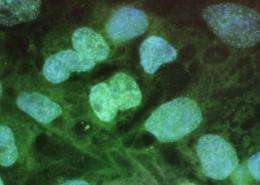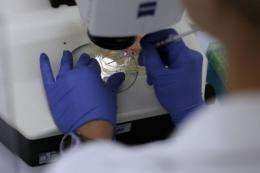Personalised stem cells back in the spotlight

Scientists on Wednesday said they had made strides in lab research in personalised stem cells, reviving interest in a goal clouded by fraud and ethical storms.
Stem cells are primitive cells that differentiate into the various tissues of the body and are touted as future replacements for diseased or damaged organs.
The idea is to take versatile stem cells from early-stage embryos that have been "cloned" to the same DNA as the patient. That way, any cells are recognised as friendly by the patient's immune system and are not attacked after being transplanted.
The standard cloning technique entails taking an egg and removing its nucleus, which contains the vital DNA code.
The core is then replaced with the nucleus of a cell from the donor, and the two parts fused by a jolt of electricity. The egg, bathed in nutrients, then divides, its genetic code thus reprogrammed.
In 2004, South Korean Hwang Woo-suk unleashed headlines around the world when he claimed to have produced a line of stem cells derived from an embryonic human clone.
After basking in glory, Hwang plunged into disgrace when it emerged he had faked many of his results and obtained his eggs unethically and illegally.
The new research, reported in the journal Nature, takes a different tack from Hwang's work.
A team led by Dieter Egli of the New York Stem Cell Foundation Laboratory left the egg's DNA intact and added DNA from an adult donor cell.

What resulted was a "triploid" cell, comprising three sets of chromosomes: 23 from the egg and 46 (two sets of 23) from the donor cell.
Cells from the "triploid" embryo show what the researchers say are signs of normal embryonic stem cells, proving the importance of leaving the egg DNA in place, according to the study, published in Nature.
The research thus lifts the fortunes for personalised embryonic stem cells after the Hwang debacle and after debated claims that non-embryonic cells reprogrammed by chemicals are almost as versatile.
However, triploid embryos are genetically abnormal and not viable, Nature cautioned in an editorial.
"It is not yet clear how triploid cells would mimic the behaviour of cells in tissue. No-one will be calling them clinically relevant any time soon," it said.
The next challenge for the researchers is to produce a stem-cell line from a "normal," diploid -- i.e. 46-chromosome -- cloned embryo, as Hwang claimed to have done do.
But even if they do so, said Nature, they would still have to tackle ethical issues.
Cloned embryonic stem cells still entail destruction of an embryo and revive fears of reproductive cloning, in which an copycat baby is created and brought to term.
The new study, keen to show transparency, says it used eggs from paid volunteers but steers clear of using the word "embryo."
Nor does it describe its results as cloning. Instead, it asserts that the DNA from the donor cells was reprogrammed to a primitive state by the egg.
Despite this, "the latest achievement points in the same direction as Hwang's claims," Nature said.
"(...) This might be a good time for the United Nations to hammer out cloning regulations or restrictions, which have been hamstrung by political and religious debate," it added.
(c) 2011 AFP
















